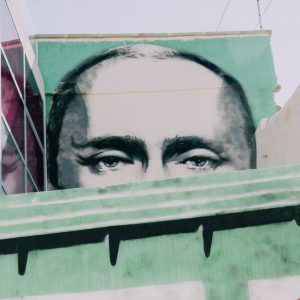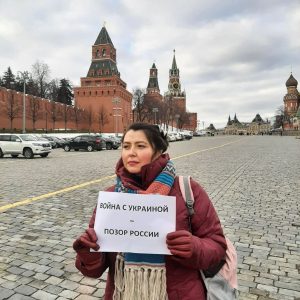Index relies entirely on the support of donors and readers to do its work.
Help us keep amplifying censored voices today.

Graffiti of Vladimir Putin. Photo: Don Fontijn/Unsplash
I have struggled to write this blog. There don’t seem to the right words for something so serious, so terrifying but so utterly predictable.
Putin has invaded Ukraine – again.
As I write there are Russian bombs falling across Ukraine. Innocent people are dying, families are sheltering from bombing raids in the underground and people are fleeing.
This act of war, from a tyrant, cannot be explained or excused. This is an effort to destabilise Europe. To re-build a Russian Empire. To secure Putin’s legacy. It is not about NATO expansionism or a security threat from Ukraine. This is all Putin. This is not about the Russian or Ukrainian people.
Putin has brought war and death to mainland Europe and the world is more unstable than at any time since the Cuban Missile Crisis. That is our shared reality in 2022. This is the consequence of allowing a dictator to operate unchecked as readers of our work at Index know only too well.
Index does not exist to pontificate about international relations and defence policy – as frustrated as we may be. Our role, always, is to provide a space and a voice for dissidents and those being persecuted. But, and it’s a big but, we were founded in the midst of the Cold War half a century ago – to promote and protect the liberal democratic value of free expression. To work behind the Iron Curtain to provide a platform for the work and personal reflections of dissidents. We did this because we believe in democracy. That the foundations of free expression are protected at the ballot box. That the ultimate expression of freedom is the right to self-determination and to peace in a free society.
The invasion of Ukraine brings to the fore the reasons why Index exists. Even in the early hours and days of this aggression we have seen misinformation used as a propaganda tool. Journalists in Russia have been instructed to only use official comment on events in Ukraine. Protesters against the war in Moscow are being arrested in the dozens. And DDoS attacks on Ukrainian cyber infrastructure is becoming the norm. Putin is seeking to control every form of communication – that is not free speech.
In the months and years ahead Index will continue to provide a platform for dissidents. We will tell the stories of those writers, artists and academics who are being silenced by Putin’s regime. We will do what we do best – be a voice for the persecuted.
But as scared as I am of events in Eastern Europe – I worry about censorship through noise (as so ably articulated by Umberto Eco) that we are about to live through. Every repressive government could move against their citizens in the coming months with little global condemnation as our world leaders seek to find peace and secure the world as we know it. As we have for over half a century Index will be a home for those dissidents too – wherever they live – highlighting their stories and publishing their work.
The months ahead are going to be awful for too many people. Tyrants will believe they have a free hand to move against their citizens. Europe faces more war and the Chinese Communist Party may well seek to manipulate events to suit themselves.
In this unstable world the work of Index has never been more vital and we will do everything we can to support those who need us most.
We, the undersigned organisations, stand in solidarity with the people of Ukraine, but particularly Ukrainian journalists who now find themselves at the frontlines of a large-scale European war.
We unequivocally condemn the violence and aggression that puts thousands of our colleagues all over Ukraine in grave danger.
We call on the international community to provide any possible assistance to those who are taking on the brave role of reporting from the war zone that is now Ukraine.
We condemn the physical violence, the cyberattacks, disinformation and all other weapons employed by the aggressor against the free and democratic Ukrainian press.
We also stand in solidarity with independent Russian media who continue to report the truth in unprecedented conditions.
Join the statement of support for Ukraine by signing it here.
#Журналісти_Важливі
Signed:
 As Russia invaded Ukraine, a modest solo demonstration took place in the centre of Moscow. Sofya Rusova, co-chair of Russia’s trade union for journalists, stood holding a hand-printed sign reading “War with Ukraine is Russia’s disgrace”. The protest followed an open letter from Russian scientists and science journalists opposing the war. A coalition of independent media outlets has condemned the invasion. Photos of small groups of young protestors in Russian cities have also been appearing on social media. Activist Marina Livinovich called for a demonstration at Pushkin Square in central Moscow but was reported to have been arrested shortly afterwards. On the first evening of the invasion, protests appeared to be spreading across Russia.
As Russia invaded Ukraine, a modest solo demonstration took place in the centre of Moscow. Sofya Rusova, co-chair of Russia’s trade union for journalists, stood holding a hand-printed sign reading “War with Ukraine is Russia’s disgrace”. The protest followed an open letter from Russian scientists and science journalists opposing the war. A coalition of independent media outlets has condemned the invasion. Photos of small groups of young protestors in Russian cities have also been appearing on social media. Activist Marina Livinovich called for a demonstration at Pushkin Square in central Moscow but was reported to have been arrested shortly afterwards. On the first evening of the invasion, protests appeared to be spreading across Russia.
These brave protesters can take inspiration from another era when Soviet tanks rolled into another sovereign nation to crush the democratic uprising known as the Prague Spring.
On 25 August 1968, the poet Natalya Gorbanevskaya joined seven others in Red Square to demonstrate against the invasion of Czechoslovakia that had taken place just days earlier. It was an extraordinary act of courage. They sat down and unfurled home-made banners with slogans that included: “We are Losing Our Friends,” “Shame on Occupiers!” and “For Your Freedom and Ours!” The slogans could just as easily apply to Putin’s Russia as Brezhnev’s Soviet Union.
Vaclav Havel, the dissident playwright and first president of the Czech Republic, later said: “For the citizens of Czechoslovakia, these people became the conscience of the Soviet Union, whose leadership without hesitation undertook a despicable military attack on a sovereign state and ally”.
The Soviet state reacted with characteristic brutality to the protestors. The activists were immediately beaten up, arrested and put on trial. Vadim Delaunay and Vladimir Dremlyuga were sent to a penal colony, Victor Fainberg was sent to a psychiatric facility. Konstantin Babitsky, Larisa Bogoraz and Pavel Litvinov were condemned to exile. Gorbanevskaya herself was initially released because she was pregnant but was later sent to a psychiatric prison.
Although these small individual protests were easily crushed by the Soviet authorities, they represented the beginnings of the dissident movement which became a direct challenge to the regime.
Index on Censorship owes its very existence to these brave dissidents. Earlier in 1968. two of the demonstrators, Pavel Litvinov and Larisa Bogoraz, had written an Appeal to World Public Opinion, alerting the international community to a show trial of a group of students accused of producing anti-Communist literature. “We appeal to everyone in whom conscience is alive and who has sufficient courage… Citizens of our country, this trial is a stain on the honour of our state and the conscience of every one of us”. The appeal attracted the support of the British poet Stephen Spender and Index was later founded as a direct response. The first edition published a number of Gorbanevskaya’s poems.
In the short term, the Russian authorities will likely be able to crush dissent just as they did in 1968. But it is impossible to completely snuff it out. As Pavel Litvinov wrote for Index on Censorship: “Only a few people understood at the time that these individual protests were becoming part of a movement which the Soviet authorities would never be able to eradicate.”
The story of Russian dissent since the Soviet era has always been one of brave individuals standing against overwhelming authoritarian power. Sofya Rusova is the latest to honour the tradition of Natalya Gorbanevskaya and those other Red Square protestors of 1968.
“I am personally so moved by the courage of the people of Belarus who won’t be silenced, even knowing the danger they are putting themselves in,” Belarusian journalist and human rights defender Andrei Aliaksandrau wrote in a letter in December 2013. He was working in London at the time as Index on Censorship’s Belarus Officer, and his letter was aimed at raising awareness of Index’s work ahead of a fundraising appeal.
Today our friend and former colleague, Andrei, will spend his 400th day behind bars in Belarus. On returning to Belarus from London in the mid-2010s, Andrei was well aware of the risks of continuing his work in defence of human rights, but he refused to be intimidated or to be silenced.
“All across the world secrets are the lifeblood of dictatorships and oppressive regimes, which is why the journalists, human rights activists and campaigners Index works with live under the fear of attack from the police services,” he wrote in the letter.
Detained and imprisoned in January 2021, Andrei is now facing charges of “treason to the state”, which stem from allegations that he paid the fines of journalists and protesters detained during the pro-democracy protests that were triggered by the highly disputed 2020 presidential election. Belarusian law enforcement agencies erroneously equate this with financing unlawful protests. If convicted, he will face up to 15 years in prison.
“If it got that bad for me, would I still have the courage to keep speaking out[?],” Andrei wondered in his letter, referring to Andrei Sannikov, the Belarusian presidential candidate, who was beaten, arrested and left in an isolation cell with a razor blade and a piece of cord, in the hope he would kill himself.
Now Andrei himself is subject to the regime’s brutality. He and his partner, Iryna Zlobina, are two of more than 1,062 political prisoners in Belarus.
Sign the petition to help us call for Andrei and Iryna’s immediate and unconditional release. You can also read a more recent letter from Andrei, which he sent to his friend Tania from behind bars.